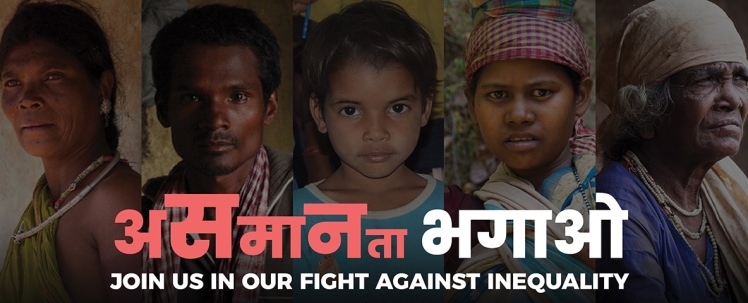To mark the World Economic Forum meet in Davos (January 22-24), civil society network, Wada Na Todo Abhiyan (WNTA), has launched a campaign, Mobilization against Inequality, with actions across 20 states, including Delhi, Bihar, Jharkhand, Chhattisgarh, Odisha, West Bengal, TN, Kerala, Manipur, Maharashtra, Arunachal Pradesh, Telangana, and UP.

The actions include submission of letters to government representatives — MLA, MP, counsellors (political leadership), DC or DM (with a copy to PM) in support of action against inequality, tweets to the PM with a common hashtag #Smashinequality requesting action on inequality, mobile action by SMSing SMASH [ART1] to 56263 to help fight inequality.
Actions planned include launch of the International Inequality report by Oxfam International, discussions on inequality as the World Economic Forum begins in Davos, followed by International Day on Education/National Girl Child Day on January 24.
WNTA concept note ahead of the campaign:
While India’s constitution commits to the principle of equality, some citizens of India are more equal than others. There are inequalities between the rich and the poor, between the genders, between the various social groups, between those with and without disabilities, between rural and urban areas and between the lived realities of those living in different states in India. This is manifested in a number of ways including access and relative quality of essential services like health and education, access and control over natural resources, taxation and banking systems, access to government planning spaces and justice among others.
Since we have grown in this unequal society, many accept inequality as inevitable. It is not. Inequality is a policy choice that governments make. A different, fairer and more equal India is possible.
Call for Action against Inequality: India 2019
We believe that a political approach is needed to fight inequality by making it a mass issue and a popular campaign, addressing the core perceptions that sustain inequality and building a culture of equality. It involves challenging the policy choices that India has made in the previous years that privileges the rich over the poor and the fundamental economic model that sustains inequality and addressing the rising phenomena of crony capitalism and privatization. At the same time, this would entail recognizing that progress has been made in the preceding decades, but the reduction in poverty and growth of the national economy should not create a sense of complacency.
What it is
At this stage the actions and the specific messaging is to a large extent decentralized recognizing that the manifestations and face of inequality is different across the country. A central design and structure cannot be done at this time and it will also allow people across India to push their own issues in their own way. Consequently, the current convergence is around a call for action, not a campaign, alliance of network. Those that are part of the process would determine the shape it would eventually take.
The mobilization, if sustained over time, could grow into a national alliance with a federal character or a movement to change the system or a campaign or something else.
This call coincides with the Global Week of Action against Inequality that provides a hook to initiate coordinated action. This is an effort to explore possibilities of synergized engagement on this issue across networks and alliances. A conscious effort will be made to bring young people and existing unions, networks and alliances into the process.
Irrespective, the intention would be to sustain the mobilization beyond the week of action. The effort would be to influence both the discourse and spaces where policy decisions are taken with equality as a focus. Three strands of work have been identified in the first few meetings of the process: addressing structural issues, immediate actionable issues/manifestations and building the public narrative (both building our own and countering the narrative that legitimizes inequality). In so doing, it is important to combine intellectual articulation with an actionable agenda.
For the time being this work will be largely informal. Oxfam India is only initiating the discussion/offering its Campaign Manager Inequality as a secretariat.
The 2019 Mobilization
The present mobilization has been timed to coincide with the Global Week of Action against inequality timed to coincide with the World Economic Forum in Davos. Action is anticipated in around 20 states including Delhi, Bihar, Jharkhand, Chhattisgarh, Odisha, West Bengal, TN, Kerala, Manipur, Maharashtra, Arunachal Pradesh, Telangana and UP – based on a common list of possible actions.
This includes common actions across the various states including:
- Offline: Submission of letters to government representatives- MLA, MP, Counsellors (political leadership), DC or DM (with copy to PM) in support of action against inequality
- Online: Tweet to the PM on the 19th with a common hashtag requesting action on inequality. The hastag for the event is #Smashinequality
- Mobile Action: SMS SMASH [ART1] to 56263 to help fight inequality. This will form a pool of supporters for the issue of inequality. This will then be shared with the government in support of action on the issue.
This is intended to be a decentralized mobilization and this is accompanied by an indicative menu of options for action. However, it would help if the Secretariat for the process (anjela@oxfamindia) is informed about the actions being planned.
Globally, the objective of the week are to disrupt the global conversations around Davos challenging corporate influence, elite capture and build the global movement against inequality. The focus of the 2019 mobilization is to help connect movement-building moments across the world in the excluded parts of cities such as Manilla, Jakarta, Delhi, Joburg, Nairobi, Tunis, Dakar, Sao Paulo, Mexico City, London and Washington DC, where urban communities hit by obscene inequality are organising to build their power and take it on – as powerful a visible demonstration of people’s collective mobilisation and organising to resist the unjust distribution of wealth and power.
Courtesy: https://counterview.org/
